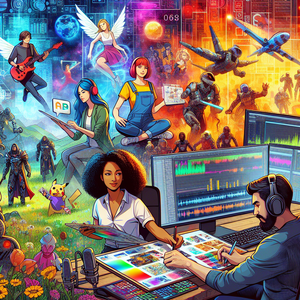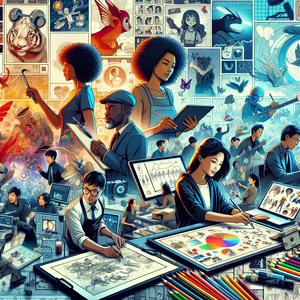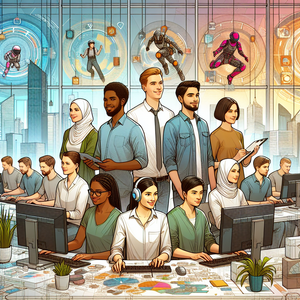
Exploring 20 Exciting Careers in the Gaming Industry: Roles, Responsibilities, and Opportunities
The gaming industry has emerged as one of the most vibrant and rapidly evolving sectors globally, merging state-of-the-art technology with captivating experiences that attract millions of players. As this industry continues to flourish, it opens up a myriad of career paths for individuals with diverse skills and passions. Whether your interests lie in the realms of creative pursuits like game design and animation or in technical domains such as programming and quality assurance, the gaming landscape is brimming with opportunities to explore.
Job Summaries:
Game Designer:
- Game designers are the visionaries behind gameplay and mechanics.
- They conceptualize game elements, create prototypes, and collaborate with artists and programmers to translate ideas into engaging experiences.
- Skills required include an understanding of game theory, creativity, problem-solving abilities, proficiency in design software, and a degree in game design or a related field.
- With an increasing demand for innovative experiences, companies are actively seeking talented game designers to craft captivating player interactions.
Video Game Programmer:
- Programmers create the code that brings games to life.
- Implementing features and ensuring seamless gameplay.
- Working closely with designers and artists.
- Skills required include proficiency in languages like C++, C#, and Java.
- Strong analytical skills are necessary.
- A background in computer science or software engineering is important.
- The need for adept programmers to develop more complex games is on the rise.
3D Artist:
- 3D artists design visual elements such as characters and environments using software like Blender, Maya, or 3ds Max.
- Skills required include artistic talent, meticulous attention to detail, and a degree in art or design.
- A strong portfolio showcasing previous work is essential.
- The demand for high-quality visuals is increasing, requiring skilled 3D artists to heighten player immersion.
Game Producer:
- Game producers oversee the entire development process.
- They manage schedules, budgets, and team dynamics to ensure successful project completion.
- Skills required include leadership, communication, and project management skills.
- A degree in business or a related field is often supported.
- Producers are critical for maintaining workflow and meeting deadlines.
- They are vital to successful game development.
Quality Assurance (QA) Tester:
- QA testers identify bugs and ensure game functionality before release.
- Systematically testing gameplay and reporting any issues.
- Skills required include attention to detail, critical thinking, and familiarity with gaming and testing methodologies.
- This entry-level role is crucial for delivering polished gameplay experiences.
- Often serves as a stepping stone for newcomers.
Community Manager:
- Community managers foster relationships between developers and players.
- Managing social media engagement and gathering player feedback.
- Skills required include excellent communication skills, a passion for gaming, and knowledge of digital marketing strategies.
- As community engagement becomes essential for a game's success, the demand for community managers is rising.
Esports Producer:
- Esports producers organize and execute competitive gaming events.
- They manage logistics and broadcasting.
- Skills required include project management and communication abilities.
- A background in event management or media production is ideal.
- With the rise of esports, producers play a critical role in delivering high-quality events to global audiences.
Game Marketing Manager:
- Marketing managers create strategies to promote games through market research and consumer insights.
- Skills required include analytical skills, creativity, and a degree in marketing or business.
- Effective marketing is crucial for a game's success, driving demand for skilled marketers, especially during launches.
Sound Designer:
- Sound designers craft the audio landscape of games, including sound effects and background scores.
- Skills required include proficiency in audio engineering software (such as Pro Tools or Logic Pro) and strong creativity.
- The importance of immersive audio experiences is on the rise, increasing the need for talented sound designers.
Game Animator:
- Animators breathe life into characters and objects, creating fluid and realistic movements.
- Skills required include expertise in animation software and a background in graphic design or animation.
- As player expectations for realism escalate, the demand for skilled animators continues to grow.
Game Writer:
- Game writers develop engaging narratives and dialogue.
- Ensuring that stories are woven seamlessly into gameplay.
- Skills required include strong writing abilities, experience in scriptwriting, and a passion for storytelling.
- Compelling narratives are vital for player engagement.
- Making this role increasingly significant in game development.
Business Development Manager:
- Identify growth opportunities for gaming companies
- Negotiate partnerships and market expansions
- Required skills include analytical skills
- Negotiation capabilities
- Background in business or sales
- Demand for business development managers is on the rise
User Experience (UX) Designer:
- UX designers strive to create intuitive player experiences through research and the development of wireframes.
- Skills required include understanding design principles, user behavior, and a degree in design or a related field.
- As player engagement takes center stage, the necessity for UX designers is rapidly increasing.
Game Localization Specialist:
- Localization specialists adapt games for various cultural and linguistic markets, ensuring accessibility and relevance.
- Skills required include proficiency in multiple languages, cultural insights, and meticulous attention to detail.
- With gaming's global reach, localization specialists have become increasingly essential.
Technical Artist:
- Technical artists connect artists and programmers.
- They optimize assets for game engines to ensure visual fidelity.
- Skills required include knowledge of both art and programming.
- Experience in game engines like Unity or Unreal is important.
- Their role is crucial in maintaining visual quality while adhering to technical constraints.
Data Analyst:
- Data analysts examine player data to guide game design and marketing strategies.
- Skills required include strong analytical abilities and experience with data visualization tools.
- Typically requiring a degree in data science or analytics.
- As data-driven decision-making becomes standard, the demand for data analysts in gaming is increasing.
Game Publisher:
- Publishers manage the distribution and marketing of games.
- Overseeing budgets and partnerships.
- Skills required include business acumen and publishing experience.
- Often supported by a degree in business or communications.
- This role is vital for connecting games with audiences and ensuring profitability.
- Leading to steady demand for skilled publishers.
Event Coordinator:
- Event coordinators organize gaming events.
- Managing logistics and vendor coordination.
- Skills required include exceptional organizational skills.
- A background in event planning is necessary.
- As gaming events gain popularity, the need for skilled coordinators is on the rise.
Game Tester:
- Game testers play through games to identify bugs and offer gameplay feedback.
- Skills required include attention to detail and effective communication skills.
- This entry-level position serves as a common entry point into the gaming industry, with numerous job opportunities available.
Social Media Manager:
- Social media managers craft strategies to promote games across platforms like Twitter and Instagram.
- Skills required include writing proficiency and familiarity with digital marketing practices.
- As social media becomes a primary marketing tool, the demand for experienced social media managers is growing.
The gaming industry offers a multitude of thrilling career options for aspiring professionals eager to combine their passions with their skills. Whether your interests lie in creative, technical, or business-oriented roles, the gaming sector presents diverse paths to suit various expertise levels and interests. Given the industry's ongoing growth and the increasing demand for talent, now is an excellent time to explore a career in gaming. For those interested in finding job openings, be sure to check out the latest listings on specialized job boards. Consider reaching out to professionals in the field for insights and guidance as you embark on your journey in this exciting industry.
Explore More Jobs

